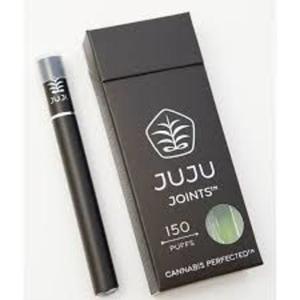The Board affirmed refusals to register POWERED BY JUJU and JUJU JOINTS for smokeless marijuana vaporizers on the ground that the identified goods are illegal under the federal Controlled Substances Act (CSA) and therefore use of the marks in commerce is unlawful. Applicant maintained that it does business only in states where marijuana is legal, and those jurisdictions comply with the Cole Memo. The Board, however, ruled that the CSA controls. In re JJ206, LLC, dba JuJu Joints, Serial Nos. 86474701 & 86236122 (October 27, 2016) [precedential].

Use of a mark must be “lawful” if the mark is to qualify for federal registration. “[A]ny goods … for which the mark is used must not be illegal under federal law.” In re Brown, 119 USPQ2d 1350, 1351(TTAB 2016). [TTABlogged here]. It follows that if the goods on which a mark is intended to be used are unlawful, there can be no bona fide intent to use the mark in lawful commerce. When the goods are illegal under the CSA, the applicant cannot use its mark in lawful commerce and it is legally impossible for the applicant to have the requisite bona fide intent to use the mark. [The POWERED BY JUJU application was based on Section 1(b) intent to use].
Applicant’s goods are identified as vaporizing devices for cannabis or marijuana. Under the CSA, it is unlawful to sell, offer for sale, or transport in interstate commerce drug paraphernalia, defined as “any equipment … primarily intended or designed for use in … ingesting, inhaling, or otherwise introducing into the human body a controlled substance, possession of which is unlawful under [the CSA].” The CSA identifies marijuana as such a substance. Based on the evidence of record, the Board concluded that “cannabis” in applicant’s identification of goods refers to marijuana.
The Board therefore found that applicant’s identified goods fall within the definition of illegal drug paraphernalia under the CSA.
Applicant contended that because it markets its goods in states that allow for the sale and distribution of marijuana, its current and intended use is lawful. The Board, however, rejected that position in Brown: “the fact that the provision of a product or service may be lawful within a state is irrelevant to the question of federal registration when it is unlawful under federal law. Id.at1351.
“Regardless of individual state laws that may provide for legal activities involving marijuana, marijuana and its psychoactive component, THC, remain Schedule I controlled substances under federal law and are subject to the CSA’s prohibitions. 21 C.F.R. § 1308.11.” Id. at 1352; see also U.S. Const. Art. VI. Cl. 2; Gonzales v. Raich, 545 U.S. 1, 27, 29 (2005); United States v. Oakland Cannabis Buyers’ Coop., 532 U.S. 483, 491 (2001).
Applicant further contended that because the jurisdictions where it does business “comply with federal directives such as the Cole Memo, its good should be considered lawful. The Cole Memo is a memorandum from the U.S. Department of Justice to United States Attorneys, addressing the enactment of medical marijuana laws in certain states. It affirmed the illegality of marijuana under the CSA and set out federal “enforcement priorities” “to guide the Department’s enforcement of the CSA against marijuana-related conduct.” The memo urged that federal enforcement efforts focus on preventing distribution of marijuana to minors, preventing violence and firearm use in marijuana-related activities, and preventing the diversion of marijuana from a legal state to other states.
The Board rejected applicant’s argument because the Cole Memo “does not and cannot override the CSA.” The memo, noted the Board, “explicitly underscores that ‘marijuana is a dangerous drug and … the illegal distribution and sale of marijuana is a serious crime.”
And so the Board concluded that because applicant’s goods constitute illegal drug paraphernalia under the CSA, use and intended us of the applied-for marks is unlawful and cannot provide a basis for federal registration. Accordingly the Board affirmed the refusals to register under Sections 1 and 45 of the Lanham Act.

